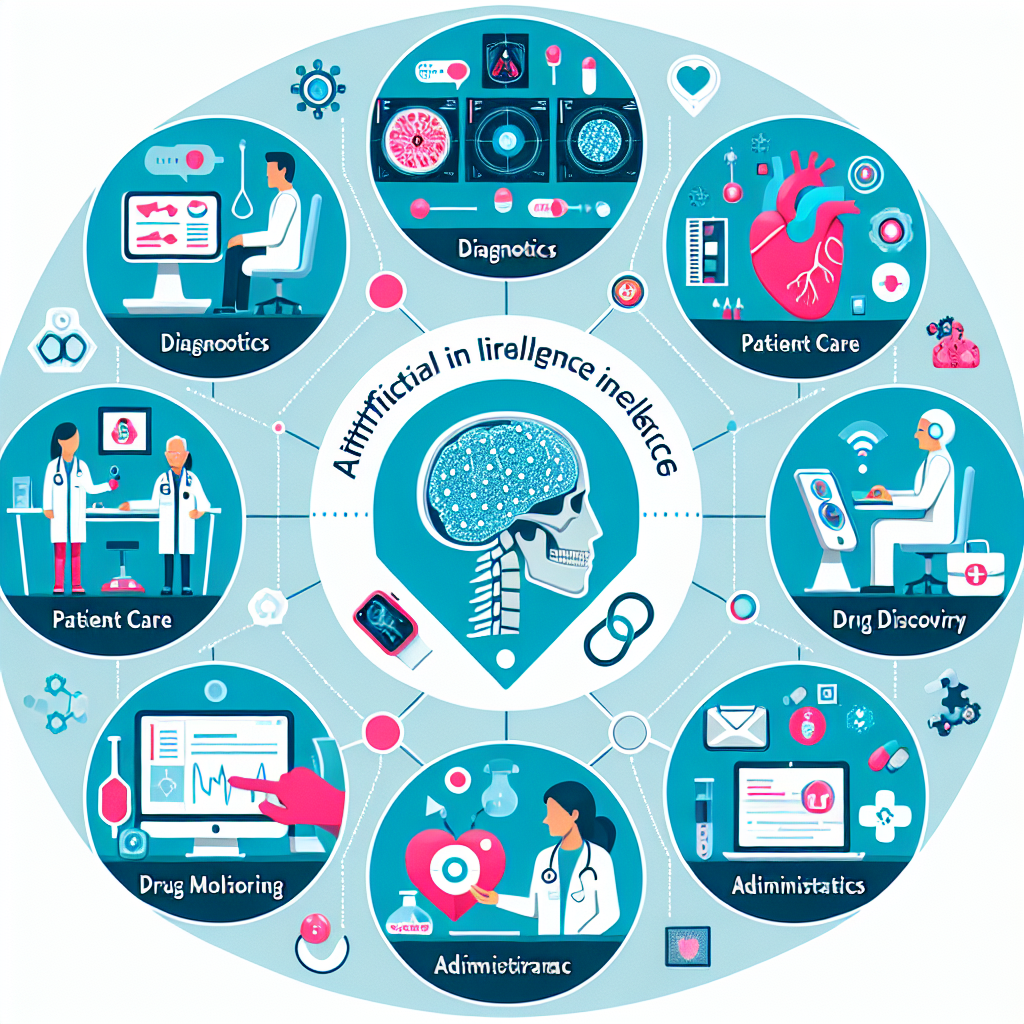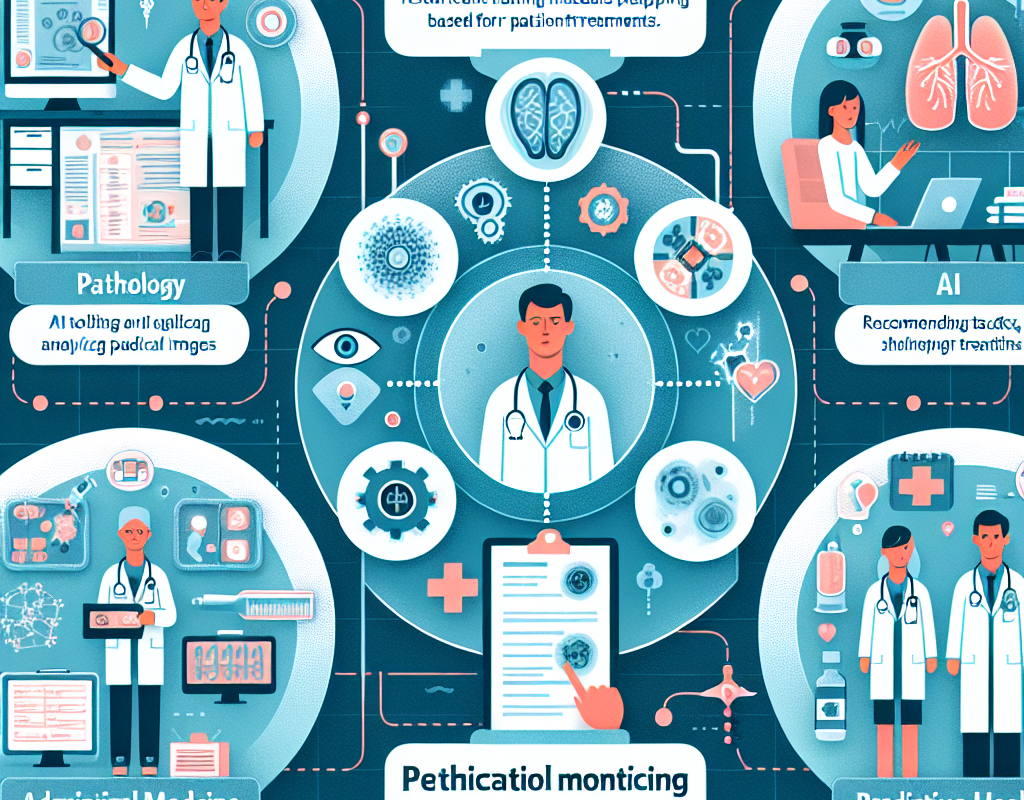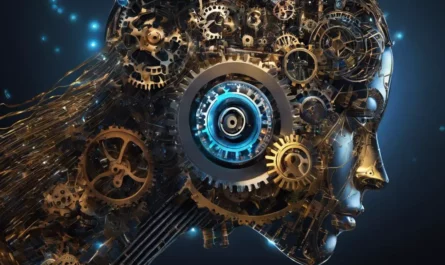Artificial Intelligence (AI) is revolutionizing various sectors, and healthcare is no exception. AI tools are being utilized in several areas within the healthcare industry to improve patient outcomes and streamline processes. Firstly, AI is used in Medical Imaging, where it helps in the accurate detection and diagnosis of diseases by analyzing complex imaging data. Secondly, AI is utilized in Predictive Analytics, where it forecasts patient outcomes and disease progression based on historical data. Thirdly, AI is used in Drug Discovery, where it accelerates the process of finding new potential drugs and predicting their effectiveness. Fourthly, AI is utilized in Personalized Medicine, where it tailors treatment plans to individual patients based on their unique genetic makeup and health history. Lastly, AI is used in Robotic Surgery, where it assists surgeons in performing precise and minimally invasive procedures.
Exploring the Use of AI Tools in Medical Imaging and Diagnostics
Artificial Intelligence (AI) is revolutionizing the healthcare industry, with its potential to enhance patient care and improve health outcomes. One of the most significant areas where AI tools are being utilized is in medical imaging and diagnostics. These tools are transforming the way healthcare professionals diagnose and treat diseases, making the process more accurate, efficient, and personalized.
AI tools in medical imaging are designed to analyze complex medical images, such as CT scans, MRIs, and X-rays, to detect abnormalities that may indicate a disease. These tools use machine learning algorithms to learn from thousands of medical images, enabling them to identify patterns and anomalies that may be missed by the human eye. This not only increases the accuracy of diagnoses but also reduces the time taken to interpret these images, thereby speeding up the diagnostic process.
Moreover, AI tools are being used to predict the progression of diseases. For instance, AI algorithms can analyze the patterns in a patient’s medical images over time to predict how a disease, such as cancer or Alzheimer’s, will progress. This can help doctors to develop a more personalized treatment plan for the patient, improving their chances of recovery.
AI is also being utilized in radiology, a field that heavily relies on medical imaging. AI tools can assist radiologists in interpreting images, identifying critical findings, and prioritizing urgent cases. For example, AI algorithms can detect signs of stroke in CT scans and alert the radiologist, enabling quicker intervention. This can significantly improve patient outcomes, as timely treatment is crucial in conditions like stroke.
In addition to aiding in diagnosis and treatment, AI tools in medical imaging are being used for preventive healthcare. They can analyze a patient’s medical images to identify risk factors for diseases, such as heart disease or diabetes, before they develop. This allows for early intervention and can prevent the onset of these diseases, leading to better health outcomes.
Furthermore, AI tools are being used to improve the quality of medical images. They can enhance the clarity of images, remove noise, and correct distortions, making it easier for healthcare professionals to interpret them. This not only improves the accuracy of diagnoses but also reduces the need for repeat scans, saving time and resources.
In conclusion, AI tools are playing a pivotal role in medical imaging and diagnostics, enhancing the accuracy and efficiency of diagnoses, predicting disease progression, assisting in radiology, aiding in preventive healthcare, and improving the quality of medical images. As these tools continue to evolve, they are expected to further revolutionize the healthcare industry, leading to better patient care and improved health outcomes. However, it is important to note that while AI can assist healthcare professionals, it cannot replace them. The human touch is still essential in healthcare, and AI should be seen as a tool to augment, not replace, human expertise.
The Role of AI in Predictive Analytics in Healthcare

Artificial Intelligence (AI) has been making significant strides in various sectors, and healthcare is no exception. The integration of AI tools in healthcare has been transformative, enhancing efficiency, accuracy, and overall patient care. One of the most impactful areas where AI is being utilized is predictive analytics.
Predictive analytics in healthcare involves the use of data, statistical algorithms, and machine learning techniques to identify the likelihood of future outcomes based on historical data. The goal is to go beyond knowing what has happened to providing the best assessment of what will happen in the future. AI tools have been instrumental in enhancing the accuracy and efficiency of predictive analytics in healthcare.
Firstly, AI tools are being used in disease prediction and prevention. By analyzing patient data, AI can identify patterns and trends that can predict the likelihood of disease occurrence. For instance, AI algorithms can analyze a patient’s genetic information, lifestyle habits, and medical history to predict the risk of developing conditions like cancer, diabetes, or heart disease. This allows for early intervention and prevention strategies, improving patient outcomes.
Secondly, AI is playing a crucial role in patient triage. AI tools can analyze a patient’s symptoms and medical history to predict the severity of their condition and prioritize treatment accordingly. This can significantly reduce waiting times in emergency departments and ensure that patients receive timely and appropriate care.
Thirdly, AI tools are being utilized in personalized medicine. By analyzing a patient’s genetic makeup, AI can predict how they will respond to different treatments. This allows healthcare providers to tailor treatment plans to individual patients, improving effectiveness and reducing the risk of adverse reactions.
Fourthly, AI is being used in resource allocation. By predicting patient flow and demand for services, AI can help healthcare providers allocate resources more efficiently. This can reduce costs, improve patient satisfaction, and enhance the overall quality of care.
Lastly, AI tools are being used in drug discovery and development. AI can analyze vast amounts of data to identify potential drug candidates and predict their effectiveness and safety. This can significantly speed up the drug discovery process and bring new treatments to market more quickly.
However, the use of AI in predictive analytics in healthcare is not without challenges. Data privacy and security are major concerns, as AI tools often require access to sensitive patient information. There are also issues around the accuracy and reliability of AI predictions, as well as the potential for bias in AI algorithms.
Despite these challenges, the potential benefits of AI in predictive analytics in healthcare are significant. By enabling early disease prediction and prevention, personalized medicine, efficient resource allocation, and accelerated drug discovery, AI has the potential to revolutionize healthcare and improve patient outcomes. As AI technology continues to advance, its role in predictive analytics in healthcare is likely to become even more significant.
In conclusion, AI tools are being utilized in various areas of healthcare, with predictive analytics being one of the most impactful. While there are challenges to overcome, the potential benefits are significant, making AI an invaluable tool in the future of healthcare.
AI and its Impact on Drug Discovery and Development
Artificial Intelligence (AI) is revolutionizing various sectors, and healthcare is no exception. One of the most significant areas where AI tools are being utilized is in drug discovery and development. The traditional process of drug discovery is time-consuming, expensive, and fraught with a high failure rate. However, AI is poised to transform this process, making it more efficient, cost-effective, and successful.
AI’s impact on drug discovery and development is multifaceted. Firstly, AI algorithms can analyze vast amounts of data to identify potential drug candidates. These algorithms can sift through millions of chemical structures, identifying those with the potential to interact with disease-causing biological targets. This process, which would take humans years to complete, can be accomplished by AI in a matter of days or even hours.
Secondly, AI can predict how a drug will interact with the human body. Using machine learning algorithms, AI can model the complex interactions between a drug and various biological systems. This allows researchers to predict a drug’s efficacy and potential side effects before it even enters clinical trials. This predictive capability can save pharmaceutical companies millions of dollars in failed clinical trials and help bring effective drugs to market more quickly.
Thirdly, AI can help optimize the drug development process. AI tools can analyze data from previous clinical trials to identify factors that contribute to a drug’s success or failure. This information can then be used to design more effective clinical trials in the future. For example, AI can help identify the optimal dosage of a drug, the best time to administer it, and the most effective combination of drugs for a particular disease.
Fourthly, AI can accelerate the process of drug repurposing. Drug repurposing involves finding new uses for existing drugs. This process can be incredibly beneficial, as it allows for the rapid deployment of effective treatments for emerging diseases. AI can analyze data on existing drugs and their effects on various diseases to identify potential new uses. This capability was demonstrated during the COVID-19 pandemic, where AI was used to identify existing drugs that could potentially be effective against the virus.
Lastly, AI can help personalize drug treatments. Every individual is unique, and what works for one person may not work for another. AI can analyze a person’s genetic makeup, lifestyle, and other factors to predict how they will respond to a particular drug. This personalized approach can increase the effectiveness of treatments and reduce the risk of adverse side effects.
In conclusion, AI is transforming the process of drug discovery and development. By analyzing vast amounts of data, predicting drug interactions, optimizing clinical trials, accelerating drug repurposing, and personalizing treatments, AI is making the process more efficient, cost-effective, and successful. As AI continues to advance, its impact on drug discovery and development will only increase, bringing us closer to a future where effective treatments for even the most complex diseases are within our reach.
How AI is Revolutionizing Patient Care and Telemedicine
Artificial Intelligence (AI) is rapidly transforming the healthcare industry, revolutionizing patient care and telemedicine. The integration of AI tools in healthcare is not only enhancing the efficiency of services but also improving patient outcomes. There are five key areas in healthcare where AI tools are being utilized to a significant extent.
Firstly, AI is being used in disease diagnosis. Machine learning algorithms can analyze complex medical data and identify patterns that humans might miss. For instance, AI can analyze radiology images to detect tumors, fractures, or other abnormalities with a high degree of accuracy. This not only speeds up the diagnostic process but also reduces the risk of human error.
Secondly, AI is playing a crucial role in predictive analytics. By analyzing patient data, AI can predict the likelihood of a patient developing a particular disease, allowing for early intervention. This is particularly useful in managing chronic diseases such as diabetes or heart disease, where early detection can significantly improve patient outcomes.
Thirdly, AI is transforming patient care through personalized medicine. AI algorithms can analyze a patient’s genetic information, lifestyle, and other factors to tailor treatments to the individual’s specific needs. This approach can increase the effectiveness of treatments and reduce side effects.
Fourthly, AI is revolutionizing telemedicine, a field that has gained significant traction during the COVID-19 pandemic. AI-powered chatbots, for instance, can handle routine inquiries, freeing up healthcare professionals to focus on more complex cases. Additionally, AI can analyze data from wearable devices to monitor a patient’s health remotely, alerting healthcare providers if there are any concerning changes.
Lastly, AI is being used in drug discovery and development. AI can analyze vast amounts of data to identify potential drug candidates, significantly speeding up the drug discovery process. Furthermore, AI can predict how a drug will interact with the body, helping to identify potential side effects early in the development process.
While the integration of AI in healthcare holds immense potential, it also presents challenges. One of the main concerns is data privacy. As AI systems require access to vast amounts of patient data, there is a risk of data breaches. Therefore, robust data security measures are essential.
Another challenge is the potential for AI to replace human healthcare professionals. While AI can perform certain tasks more efficiently than humans, it lacks the human touch that is so crucial in healthcare. Therefore, it is important to strike a balance between utilizing AI to improve efficiency and maintaining the human element of healthcare.
In conclusion, AI is revolutionizing patient care and telemedicine, with its use in disease diagnosis, predictive analytics, personalized medicine, telemedicine, and drug discovery. However, it is crucial to address the challenges associated with AI integration to fully harness its potential. As AI continues to evolve, it is set to play an increasingly important role in healthcare, promising a future where healthcare is more efficient, personalized, and accessible.
Final Thoughts About AI Use In Healthcare
In conclusion, AI tools are significantly transforming the healthcare sector in various ways. They are being utilized in areas such as medical imaging and diagnostics, where they help in the accurate detection and interpretation of diseases. In drug discovery, AI expedites the process of finding new drugs and predicting their effectiveness. AI is also used in predictive analytics to anticipate patient outcomes and in personalized medicine to tailor treatment to individual patient needs. Lastly, AI is utilized in robotic surgery for precision and minimization of human error. These applications are enhancing efficiency, accuracy, and personalized care in the healthcare industry.




